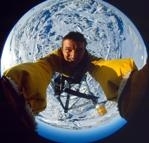Good point. The answer is yes and no. I haven't really been exercising my hands or shoulder. I have been exercising my feet and knee. I can also develop acute tendon pain (of the same nature as above) immediately after exercising a joint (e.g. my elbow and ankle had sharp pain immediately after playing football with my kids on the weekend) but it passes completely after a couple of hours. The pain is not in my muscles. Maybe my pain business is a red herring, maybe not. I think that the link between my CPAP use and this joint-pain feature is pretty compelling though. In spite of the pain, however, my mood, energy levels and mental alertness are definitely benefiting from CPAP. Cheers,SleepingUgly wrote:Are the parts that hurt, parts that he is exercising?
CompSA, Hypoventilation, PLMs, Bradycardia and Hypotension?
- blizzardboy
- Posts: 368
- Joined: Mon Feb 15, 2010 12:13 am
- Location: South Australia
Re: CompSA, Hypoventilation, PLMs, Bradycardia and Hypotension?
Machine: Resmed VPAP Adapt SV Enhanced
Mask: Resmed Quattro/Mirage Liberty
Humidifier: Resmed H2i
Other comments: Sleepzone heated tube; CMS-50E SPO2 & CMS-60C ABPM
Mask: Resmed Quattro/Mirage Liberty
Humidifier: Resmed H2i
Other comments: Sleepzone heated tube; CMS-50E SPO2 & CMS-60C ABPM
- blizzardboy
- Posts: 368
- Joined: Mon Feb 15, 2010 12:13 am
- Location: South Australia
Re: CompSA, Hypoventilation, PLMs, Bradycardia and Hypotension?
Its hard to imagine why my fingers and toes would be sore due to me staying in one position when sleeping with CPAP.SleepingUgly wrote:...Dr. Guilleminault describes increased PLMS with CPAP use as due to more supine sleep with CPAP use, not due to some "unmasking" of PLMD (this is not to say that phenomena couldn't occur). Just wondering if perhaps there is something about sleeping with CPAP that increases soreness, such as being in one position more.
Given that both my PSG report describe 450ish unusual leg movements and the fact that I get restless legs when sitting in my recliner before bed each night, the evidence would seem to indicate that I have a leg movement problem. Let's see what this new sleep doctor has to say after he reads my PSG data for himself. Cheers,
Machine: Resmed VPAP Adapt SV Enhanced
Mask: Resmed Quattro/Mirage Liberty
Humidifier: Resmed H2i
Other comments: Sleepzone heated tube; CMS-50E SPO2 & CMS-60C ABPM
Mask: Resmed Quattro/Mirage Liberty
Humidifier: Resmed H2i
Other comments: Sleepzone heated tube; CMS-50E SPO2 & CMS-60C ABPM
- SleepingUgly
- Posts: 4690
- Joined: Sat Nov 28, 2009 9:32 pm
Re: CompSA, Hypoventilation, PLMs, Bradycardia and Hypotension?
Wait a second... you have restless leg symptoms??? When did that start? Do you have trouble falling asleep due to these symptoms?blizzardboy wrote:Given that both my PSG report describe 450ish unusual leg movements and the fact that I get restless legs when sitting in my recliner before bed each night
Aside:
http://www.journalsleep.org/Articles/280720.pdf
_________________
| Mask: Swift™ FX For Her Nasal Pillow CPAP Mask with Headgear |
| Humidifier: S9™ Series H5i™ Heated Humidifier with Climate Control |
| Additional Comments: Rescan 3.10 |
Never put your fate entirely in the hands of someone who cares less about it than you do. --Sleeping Ugly
Re: CompSA, Hypoventilation, PLMs, Bradycardia and Hypotension?
I'm reachin' for my credit card with one hand and the phone with the other...Sleeping Ugly wrote:How about the one that doubles as vacuum cleaner? Call in the next 24 hours and we'll throw in a gallon of distilled water FREE.
Well,if your pain gets this bad, then I suspect it's significantly more pain than most people experience with PLMD:blizzardboy wrote:Hi -SWS, I don't know how it for other people, nor do I suspect that I have more pain than others.-SWS wrote:Blizzardboy, at this point in the evolving discussion, why do YOU suspect that you might have more pain than most people with SDB---and quite possibly more pain than most people with PLMD? Does it currently interfere with restful sleep on a regular basis?
I hope other PLMD sufferers can offer anecdotal comparisons.I told him the pain was so bad at times my body was going into shock.
That seems to fall in line with what blizzardboy's doctor also speculated:dsm wrote:but CO2 imbalance just keeps staring me in the face.
That could presumably result from CPAP-emergent hypocapnic fluctuations. I believe those hypocapnic CO2 and pH dynamics essentially mimic what happens in daytime hyperventilation syndromes unrelated to CPAP---and with those similar daytime-hyperventilation CO2/pH dynamics stiffness is a commonly reported symptom according to Mr. Google...blizzardboy wrote:Felt that my nerves could be affected by changing blood pH with no mechanical joint problem. He made a comparison with the pain of shingles, saying that some sufferers wish they could cut the limb off. Wondered if my nerves might be hypersensitive.
The severity or frequency of your leg movements in your pre-CPAP or diagnostic study were both significant and comparable to what you experienced in the ASV titration. If your pains are CPAP-emergent, then I think we have two working theories so far: 1) your doctor's CPAP-altered pH theory, or 2) PLMs that are now MORE severe/frequent than those PLMs measured in both of your studies---since your pre-diagnostic PLMs frequency never caused these new pains.blizzardboy wrote:Given that both my PSG report describe 450ish unusual leg movements and the fact that I get restless legs when sitting in my recliner before bed each night, the evidence would seem to indicate that I have a leg movement problem.
- blizzardboy
- Posts: 368
- Joined: Mon Feb 15, 2010 12:13 am
- Location: South Australia
Re: CompSA, Hypoventilation, PLMs, Bradycardia and Hypotension?
I've have restless legs at night for at least 5 years back that I can recall. I have had twitchy shoulders in the evenings for many years (20?) though. Maybe not related. Nothing stops me falling asleep. I always have, and continue to, fall asleep with ease.SleepingUgly wrote:Wait a second... you have restless leg symptoms??? When did that start? Do you have trouble falling asleep due to these symptoms
JUST A THEORY. I have a new theory on my condition (in spite of my latest HCO3 result): I am a CO2 retainer. EtCO2 can be normal or lower than normal. Might explain my arousals. During sleep I do hypoventilate (slow rate of breathing) and have low minute volume. Going on CPAP might be increasing my CO2 ventilation rate thus changing my blood pH and affecting my joints. Relaxing in my chair at night causes my CO2 ventilation to drop and restless legs results from the resulting change in my blood chemistry. This effect continues as I sleep manifesting as a bunch of PLMs. PCO2 can be abnormally elevated during exercise (explains my repeated bouts of nausea, sweating, clammy skin and vomiting immediately following relatively strenuous exercise over the years.) JUST A THEORY!
Which reminds me again of:
I am going to have to get a bit more insistent with my medical team I think. None of them has been interested in testing my lung function to date. I want a test! Just got to get a referral now. Cheers,Muffy wrote:BTW, tell him we need a "Complete" PFT (including an MVV) and not just a "Screener".
Machine: Resmed VPAP Adapt SV Enhanced
Mask: Resmed Quattro/Mirage Liberty
Humidifier: Resmed H2i
Other comments: Sleepzone heated tube; CMS-50E SPO2 & CMS-60C ABPM
Mask: Resmed Quattro/Mirage Liberty
Humidifier: Resmed H2i
Other comments: Sleepzone heated tube; CMS-50E SPO2 & CMS-60C ABPM
Re: CompSA, Hypoventilation, PLMs, Bradycardia and Hypotension?
I told him the pain was so bad at times my body was going into shock.
I can tell how well my meds are working for my PLMD by my degree of pain. While PLMD is considered mostly a leg thing, it can affect the arms, trunk, face - you name it. BB, funny you should mention it feeling like an injury. In a video I have of myself sleeping, at one point while side sleeping my leg slings out so violently that in the video I can be be seen and heard grabbing my wrenched knee and crying out "OWWWW!!" At my worst, there were only a few square inches of my body that didn't hurt horribly. I remember saying once that it felt like I had a toothache in my knees. The pain often brought me to tears. After seeing video, it's easy to think that my lower back pain and hip pain were also from my movements. My body had been abused beyond belief for years. Last week I showed a few old friends just some still clips from my video, and when I saw them tonight, they were saying how they couldn't get it out of their mind and had been telling others because it was so shocking. However, the extreme intensity of my movements was likely not what the usual PLMD sufferer experiences - can't say that for sure, but mine was exacerbated by the med I was on. Which makes me wonder, BB, if (and that's a big IF) your movements are either caused or worsened by a med, you could be experiencing something beyond the usual PLMD too. Just seems if you have anywhere near this amount of sleep activity, your wife would be complaining.I hope other PLMD sufferers can offer anecdotal comparisons.
I am following with interest the discussion of what symptoms might come from different levels of things in the blood that I don't understand. Sounds believable, I'm just clueless. Eagerly awaiting your doc's review and report.
_________________
| Mask: TAP PAP Nasal Pillow CPAP Mask with Improved Stability Mouthpiece |
| Humidifier: S9™ Series H5i™ Heated Humidifier with Climate Control |
| Additional Comments: Bleep/DreamPort for full nights, Tap Pap for shorter sessions |
My SleepDancing Video link https://www.youtube.com/watch?v=jE7WA_5c73c
- blizzardboy
- Posts: 368
- Joined: Mon Feb 15, 2010 12:13 am
- Location: South Australia
Re: CompSA, Hypoventilation, PLMs, Bradycardia and Hypotension?
Quote just in from sleep lab "yes of course."-SWS wrote:One question I have is whether your outstanding flow limitations above 10 cm happen to cause any RERA's. Blizzardboy, can you refresh my memory regarding RERA's? Did your PSG team look for those with respect to flow limitations?
BTW, I am picking up my PSG data this Friday am, burnt to DVD. Cheers,
Machine: Resmed VPAP Adapt SV Enhanced
Mask: Resmed Quattro/Mirage Liberty
Humidifier: Resmed H2i
Other comments: Sleepzone heated tube; CMS-50E SPO2 & CMS-60C ABPM
Mask: Resmed Quattro/Mirage Liberty
Humidifier: Resmed H2i
Other comments: Sleepzone heated tube; CMS-50E SPO2 & CMS-60C ABPM
- blizzardboy
- Posts: 368
- Joined: Mon Feb 15, 2010 12:13 am
- Location: South Australia
Re: CompSA, Hypoventilation, PLMs, Bradycardia and Hypotension?
She has never mentioned my limb movements. I think they would have bothered her if they were quite violent. I am hoping that I can see my PSG video footage for myself after I pick it up this Friday. Cheers,kteague wrote:Just seems if you have anywhere near this amount of sleep activity, your wife would be complaining.
Machine: Resmed VPAP Adapt SV Enhanced
Mask: Resmed Quattro/Mirage Liberty
Humidifier: Resmed H2i
Other comments: Sleepzone heated tube; CMS-50E SPO2 & CMS-60C ABPM
Mask: Resmed Quattro/Mirage Liberty
Humidifier: Resmed H2i
Other comments: Sleepzone heated tube; CMS-50E SPO2 & CMS-60C ABPM
Re: CompSA, Hypoventilation, PLMs, Bradycardia and Hypotension?
Ohhhhh, right!-SWS wrote:Hairy problem to work on if you ask me.
Fortunately, I found a swanky new Salon across town...

so I'll get myself spiffed up shortly.
Cheers.
Muffy
________________________________
Machine: Dell Dimension 8100
Mask: 3M N-95 (during flu season)
Humidifier: Avoided, tends to make me moldy
Software: XP Pro
Additional Comments: You can't find a solution when you don't know the problem
Machine: Dell Dimension 8100
Mask: 3M N-95 (during flu season)
Humidifier: Avoided, tends to make me moldy
Software: XP Pro
Additional Comments: You can't find a solution when you don't know the problem
Re: CompSA, Hypoventilation, PLMs, Bradycardia and Hypotension?
THAT'S a solution to a hairy problem... and yet with perks!
Re: CompSA, Hypoventilation, PLMs, Bradycardia and Hypotension?
There's much in your unusual lot to be admired. I personally suspect some of that lot might have to do with a combination of having fit Dabrowski's phenotype we discussed earlier and your unusual exposure to stress early in life. But far more than admiring any environmental or genetic circumstances that you had absolutely no control over, it's what you DID with your lot in life that turned you into one of my real-life heroes thirty-eight pages ago. I think that speaks mountains... If life's accomplishments and experiences were edifices, some people build astoundingly eloquent architecture on less-than-ideal lots.blizzardboy wrote:Seems to be my lot?-SWS wrote:I don't think that's a common SDB presentation.
In that case, more flow limitation chit-chat from me....blizzardboy wrote:Quote just in from sleep lab "yes of course."-SWS wrote:One question I have is whether your outstanding flow limitations above 10 cm happen to cause any RERA's. Blizzardboy, can you refresh my memory regarding RERA's? Did your PSG team look for those with respect to flow limitations?
BTW, I am picking up my PSG data this Friday am, burnt to DVD. Cheers,
- blizzardboy
- Posts: 368
- Joined: Mon Feb 15, 2010 12:13 am
- Location: South Australia
Re: CompSA, Hypoventilation, PLMs, Bradycardia and Hypotension?
I'm going to print that off and put it up in a frame. Beautifully put.-SWS wrote:If life's accomplishments and experiences were edifices, some people build astoundingly eloquent architecture on less-than-ideal lots.
So last night (http://users.adam.com.au/sixsome/ASV/0510/051910/) I did an experiment comparing fixed CPAP@9.6 to ASV with EEP=9.4 and PS=4->9. Switching at 0330, when I awoke temporarily, there is quite a dramatic difference in my response to the two settings. I am particularly interested in the increase in baseline resp rate and reduction in resp variation following transfer to ASV. Please note that when I awoke this morning I had no joint pain. Having the ASV setup like that reminded my of when I used the Bipap ASV machine during my trial period, in that I could feel a more dramatic dump of air from my lungs when the machine dropped back to the EEP phase of the cycle. Also interesting to note that I first experienced joint pain when I went onto the S9 part of my trial period, which immediately followed my trial of the Bipap ASV.-SWS wrote:In that case, more flow limitation chit-chat from me....
One thing that I hadn't thought to mention was that between the ages of 15 until 27 I suffered from chronic lungs infections (at least 2 per year). During this period I had regulary bouts of acute stomach pain and associated vomiting and nausea, once causing me to be hospitalised. I had a tests over this time but no-one ever found a cause. Finally, at the age of 27, during a work trip to Germany, I had a similar bout of stomach pain and vomiting but this time I got really sick. I crawled through the suburb I was living in a eventually located a doctor who proceeded to poke my appendix and nearly sent me through the roof. I was rushed to hospital and had an emergency appendectomy. Since that time (11 years) I haven't had one bout of stomach pain or a lung infection. I just wonder if 12 or so years of lung infections has taken its toll on my lungs some how? Maybe not on MVV, but on gas exchange efficiency?
Anyhow, let's see what comes of a comprehensive pulmonary function examination. I am now determined to make this happen! Cheers,
Machine: Resmed VPAP Adapt SV Enhanced
Mask: Resmed Quattro/Mirage Liberty
Humidifier: Resmed H2i
Other comments: Sleepzone heated tube; CMS-50E SPO2 & CMS-60C ABPM
Mask: Resmed Quattro/Mirage Liberty
Humidifier: Resmed H2i
Other comments: Sleepzone heated tube; CMS-50E SPO2 & CMS-60C ABPM
Re: CompSA, Hypoventilation, PLMs, Bradycardia and Hypotension?
BB
whilst a split night test has its limitations, that RR data is quite telling. I might guess that if you drop the EEP on the Vpap Adapt SV to 8 when switching from CPAP mode to SV mode, you might see the same RR pattern showing all along the chart.
Also I wonder if you have hit on something in regard to your gas exchange having been negatively impacted by the period of infections you mention.
Also am thinking you may well be your own best diagnostician.
Cheers
DSM
whilst a split night test has its limitations, that RR data is quite telling. I might guess that if you drop the EEP on the Vpap Adapt SV to 8 when switching from CPAP mode to SV mode, you might see the same RR pattern showing all along the chart.
Also I wonder if you have hit on something in regard to your gas exchange having been negatively impacted by the period of infections you mention.
Also am thinking you may well be your own best diagnostician.
Cheers
DSM
xPAP and Quattro std mask (plus a pad-a-cheek anti-leak strap)
- blizzardboy
- Posts: 368
- Joined: Mon Feb 15, 2010 12:13 am
- Location: South Australia
Re: CompSA, Hypoventilation, PLMs, Bradycardia and Hypotension?
So maybe the issues at play are (1) I need sufficient base pressure to keep my airway open and then (2) I need enough differential between IP and EP to ensure adequate ventilation of my lungs. Let's see what comes of it all. Cheers,dsm wrote:whilst a split night test has its limitations, that RR data is quite telling. I might guess that if you drop the EEP on the Vpap Adapt SV to 8 when switching from CPAP mode to SV mode, you might see the same RR pattern showing all along the chart.
Machine: Resmed VPAP Adapt SV Enhanced
Mask: Resmed Quattro/Mirage Liberty
Humidifier: Resmed H2i
Other comments: Sleepzone heated tube; CMS-50E SPO2 & CMS-60C ABPM
Mask: Resmed Quattro/Mirage Liberty
Humidifier: Resmed H2i
Other comments: Sleepzone heated tube; CMS-50E SPO2 & CMS-60C ABPM











